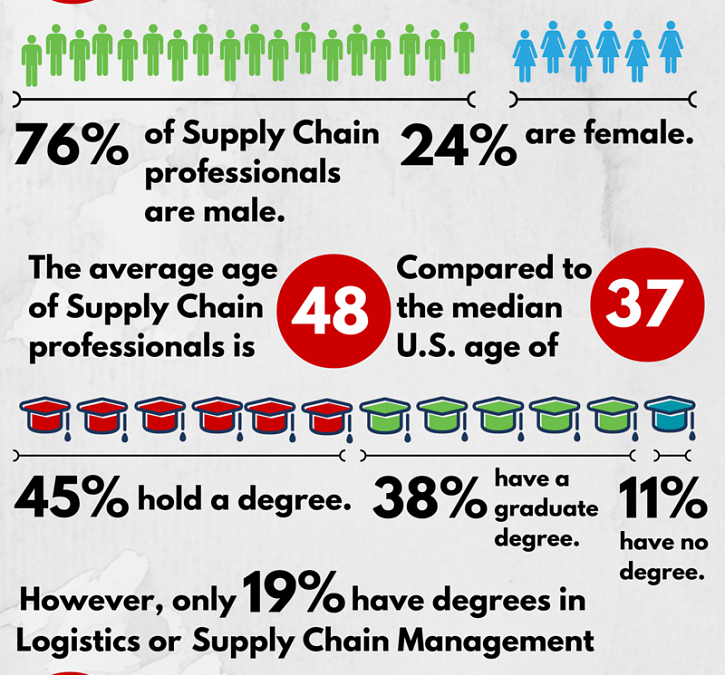
by Jennifer Hart Yim | May 30, 2017 | Blog, Logistics, Supply Chain, Talent
Is the Supply Chain talent gap problem really a talent management problem?
This guest post comes to us from Argentus Supply Chain Recruiting, a boutique recruitment firm specializing in Supply Chain Management and Procurement.
As a recruitment company completely specialized in Procurement and Supply Chain, we’re interested in following the so-called “talent deficit” in the field from all angles and perspectives. The fact is, it’s becoming harder for companies for find the talent that they need for these positions as baby boomers retire and the function evolves. As trade publication Supply Chain 24/7 puts it, “study after study has shown that for every new Supply Chain Manager entering the workforce, two (or more) are retiring.”
It’s a serious issue.
But the more you look at this issue, and the more perspectives you seek, the more you realize how complex it truly is: We’re witnessing a generational shift in the Supply Chain industry whereby more young people are entering the field. Technology has developed rapidly over the past 10 years, with big data, 3-D printing, Blockchain and automation promising to upset the apple cart completely over the next 10. It’s not just that people are retiring. It’s that finding people who have a depth of understanding of how to harness these new technologies is going to be a major driver of company competitiveness over the coming years, and they’re hard to find.
That growing demand is part of what makes Supply Chain such an attractive field for young people who are interested in business that combines global exposure, strategic problem solving, technology, and data. More universities and colleges are offering Supply Chain Management programs. But the skills required are always evolving, and how can the industry ensure that people are adequately skilled when they themselves can’t always predict the technological picture 3-5 years down the road?
Lack of talent management?
There was a thought-provoking blog post on this topic in Supply Chain Management Review this week by Supply Chain Professor Michael Gravier. Titled, “Lack of Supply Chain Talent – or Lack of Talent Management?”, the post talks about the talent deficit from the perspective of someone who’s very much in the trenches of preparing tomorrow’s Supply Chain leaders for tomorrow’s workforce.
Professor Gravier’s point is pretty simple, but pointed: “Young people who go into Supply Chain and manufacturing jobs complain that employers demand creativity during the hiring process, yet have no tolerance for new ideas in the workplace.”
In other words, companies are eager to lock down the highest-potential candidates — which only makes sense because of course you want the best talent, and of course you don’t want that talent going to your competitors. But once those candidates are placed? In Gravier’s eyes, organizations don’t necessarily take the next step and let them contribute in a creative way. For Gravier, millennial workers — especially high performers — specifically demand a higher level of engagement and skill growth than employers might be accustomed to. And, by putting these new workers in transactional roles without much opportunity for growth, companies are jeopardizing their long-term talent goals and putting themselves in danger of falling behind.
As Gravier puts it: “There’s evidence that companies show little commitment to developing and rewarding needed skills, and companies hire top-notch graduates in order to avoid having to deal with people problems later, which shows that there’s likely insufficient training and support as personnel move into supervisory positions.”
The reality for Supply Chain
A few things are worth mentioning from our perspective: for one, there’s always going to be a low person on the totem pole at any company. Workers have always had to “pay their dues” for the first couple years of their career, no matter the field, whether it’s doing dishes or preparing purchase orders. So it’s a bit unreasonable for recent Supply Chain grads to expect highly strategic roles right out the gate. For another, it makes sense for companies to want to hire the best people now, even if it means putting them in roles where they might not be developing as quickly as they would like?
On the other hand, if companies truly want to get ahead of their competitors, doesn’t it make sense to put resources into training, mentorship and skills development?
Whatever you make of his argument, it’s pretty easy to agree on one thing: Companies need to do all they can not only to attract great candidates, but to help them thrive and grow — both to keep those candidates’ eyes from wandering other opportunities, and to unlock the innovation that these candidates can provide.
But what do you think? Are companies developing junior prospects in Supply Chain well, or leaving them in entry-level positions for too long? Are you near the beginning of your career? Or does your company hire a lot of junior Supply Chain staff? Let us know in the comments!

by Jennifer Hart Yim | Dec 12, 2016 | Blog, Strategy, Talent
Posting open positions to job boards don’t work for job seekers, and they create more busy work for employers. So why do companies still use them?
This guest post comes to us from Argentus Supply Chain Recruiting, a boutique recruitment firm specializing in Supply Chain Management and Procurement.
Every year, recruitment technology evolves. Skype comes along and offers an approximation of in-depth, in-person job interviews. New Applicant Tracking systems make the job application process more humane or, depending on your luck, more arduous, albeit efficient for hiring managers. New social media sourcing techniques allow recruiters to tap into networks of people they couldn’t find before. New websites and hiring tools emerge, claiming to be “talent networks” and insisting — when advertising themselves to recruiters — that they “aren’t job boards.”
For good reason. Whether you’re a recruiter, or a candidate looking for your next opportunity, or a company looking to hire, job boards don’t get you the best results.
In our opinion, it’s time to ditch them once and for all.
Job boards don’t work for job seekers
If you speak with a frustrated job seeker, you’ll inevitably hear that they’ve applied to dozens of jobs and never heard anything back. This is a symptom of the culture of job boards more than hiring managers’ indifference to any single applicant. The fact is, if you apply using a job board, your resume is going into a black hole among hundreds of other resumes. If anyone reads your resume at all, it’s likely a junior HR person doing the initial culling who doesn’t necessarily understand the nature of the job. A junior HR person who has 400 other resumes to review. A junior HR person who might get distracted by a phone notification, or a daydream, or a co-worker telling them there are cookies in the break room, and not even pay attention to your carefully crafted resume because there are just so many more to get through. Tons of jobs end up on job boards because the company wants to show that they’re reviewing outside applicants, even if they know they’re hiring internally. Beyond that, tons of jobs never even make it to job boards in the first place.
It’s easy to criticize job boards for being an impersonal way to assess hires. The thing is, that would be okay if job boards worked. But for most job seekers, they don’t.
So why do companies use them?
Don’t be part of the problem
A big part of it is the convenience: Job boards let companies adopt a “set it and forget it” mentality. It lets them post a job description, sit back and wait for the candidates to roll in. Easier than sourcing candidates, looking for referrals, working with external partners, right? Except that you’ve created a a ton of busywork for your team, and now they have to scan through tons of irrelevant resumes. You have to respond to those applications (and let’s be honest, many companies don’t) or risk taking a hit to your company’s reputation. You can ignore the irrelevant applications and contribute to the black hole mentality, making finding a job seem even less personable than it already is. Then you’re part of the problem, and what HR department wants to be part of the problem?
No one does. The paradox is that the easier job boards become to use, the less relevant the applications become. Once you can apply for a job with a single click (like on LinkedIn’s job postings), you can easily apply to hundreds of jobs that you have no business applying for. The mismatched resumes proliferate, and so does the busywork.
Thinking of hiring in terms of opportunity cost
One of the most difficult things to assess in business is the opportunity cost of decisions. Perhaps the biggest opportunity cost of using job boards is that you completely ignore the passive candidate market — people who aren’t looking for jobs, but would be open to a move. Any HR department or hiring manager worth their salt will source passive candidates in addition to using job boards. But if you rely on job boards entirely, you’re passing up what are the best candidates around.
For these and other reasons, we decided to stop using job boards a few years ago and haven’t looked back. As recruiters in a high-demand industry, we needed to focus on our own network and passive talent, and we think companies and candidates should do the same thing.
While it’s certainly still possible to find a job using job boards, or to find a great candidate using job boards, it’s one of the more inefficient ways of connecting people with jobs — short of attaching a resume to a camel and hoping said camel makes it all the way across the Sahara Desert to an employer. So it’s time to ask — is it possible to do better?
Related posts:

by Jennifer Hart Yim | Aug 24, 2016 | Blog, Manufacturing & Distribution, Strategy, Supply Chain, Talent

The Supply Chain industry is changing, while it’s becoming harder for companies to hire at the same time. These supply chain demographics provide a picture of the industry today.
This guest post comes to us from Argentus Supply Chain Recruiting, a boutique recruitment firm specializing in Supply Chain Management and Procurement.
Everyone knows the Supply Chain field is changing. Recently, one of the best Supply Chain publications out of the U.S., Supply Chain 24/7, released a report that examines the demographic trends underlying the industry. The report, titled “A Portrait of the Supply Chain Manager,” used research survey data from Peerless Research Group and APICS to present a picture of the typical individual working in Supply Chain. The survey asked a number of Supply Chain and talent-related questions, such as:
- What percentage of Supply Chain professionals received a raise last year?
- What percentage of Supply Chain managers hold a degree?
- What percentage of companies are willing to pay above-market compensation for the right people?
And more. These issues are sure to be of interest, whether you’re looking to hire in Supply Chain or just to get a holistic picture of the field. So we put together this spiffy infographic that highlights the answers to these questions and some other interesting datapoints from the report. Check out the infographic below!

We hope you found the supply chain demographics infographic informative, and we encourage you to dig into the full report for even more insights about where Supply Chain professionals stand and where the field is going. And (as always) stay tuned for more info and perspective about Supply Chain and talent from Argentus in the coming days and weeks!
Related posts:





